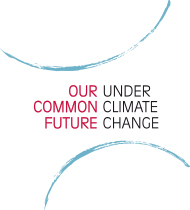�
Our Common Future Under Climate Change
International Scientific Conference 7-10 JULY 2015 Paris, France
CIFOR
Charcoal production in sub-Saharan Africa can be sustainable
201507-08
By Susan Onyango
Henry Neufeldt will present at the session on Land-based mitigation: agriculture, forests, bioenergy on Day 2.
The outcome document of Open Working Group of the Sustainable Development Goals includes a goal to �Ensure access to affordable, reliable, sustainable and modern energy for all�.�
At the same time, in Africa alone, over 80% of the population still depends on firewood and charcoal for cooking, and this is unlikely to change due to population growth and rising urbanization.�
So rather than condemning traditional sources of energy, what is needed are sustainable woodfuel systems to avoid forest degradation and generate positive development.�
The question is: How can the sustainable use of tree-based bioenergy be a solution to development, as well as mitigation and adaptation to climate change?
Charcoal is one of the most commercialized resources in sub-Saharan Africa. FAO (FAOSTAT, 2014) estimates official charcoal production for Africa to be 30.6 million tons in 2012, worth between US$9.2 billion and US$24.5 billion annually (UNEP 2014). Despite this huge value of production, policies to effectively govern the sector are lacking in most African countries.�
�Authorities tend to view charcoal production and use as an environmental health problem,� remarked Henry Neufeldt, the head of the climate change unit at the World Agroforestry Centre (ICRAF). �However, if managed properly charcoal can provide a low-cost and locally available energy source that has the potential to become sustainable and contribute significantly to poverty alleviation.�
According to the authors of the paper, the main obstacles to sustainable charcoal value chains in sub-Saharan Africa are related to the absence of legal frameworks for the sector and include low income for producers and lack of incentives to invest in high efficiency kilns; corruption and rent seeking; foregone tax revenues; and low capacity for policy implementation and enforcement.�
The working paper titled From Transition fuel to viable energy source: improving sustainability in the sub-Saharan charcoal sector identified key areas where interventions are required to improve sustainability while ensuring charcoal continues to provide livelihood benefits. These interventions encompass market mechanisms such as financial incentives and regulation of charcoal markets, as well as knowledge and capacity development incorporating knowledge sharing, stakeholder empowerment, and strengthened governance and sustainability in the charcoal sector.�
The paper provides evidence of how a sustainable, transparent and properly regulated and governed charcoal sector could be part of the solution to energy access and economic challenges faced by many developing countries. While the paper focuses on sub-Saharan Africa, some of the recommendations may be equally applicable to other charcoal-dependent developing countries. Key recommendations include:
-- Improve sustainability in the charcoal sector, and reduce associated degradation, through exploring community-based forest management options, growing trees outside forests, strengthening tenure and property rights, and implementing guidelines on sustainable harvesting and production
-- Improve governance and financial management and reporting across the charcoal value chain to create a regulated, transparent and coordinated sector, which formally contributes to national economies
-- Increase participation by disempowered stakeholders in the charcoal sector to encourage greater uptake of more efficient technologies and more sustainable management practices
-- Transform the negative image of charcoal, allow for sub-national governments to earn charcoal revenues and tap into internationally recognized mechanisms to create incentives for investment in a sustainable charcoal sector
Further empirical research is needed to support the hypothesis that a legalized and regulated charcoal industry can help improve livelihoods for participants in the value chain, particularly the rural poor. This will at the same time contribute to reduced deforestation and forest degradation.�
�Links between charcoal production and deforestation and degradation need further clarification so that current and future impacts on land cover, the regional water balance and the global climate can be appropriately addressed. The capacity of agroforestry systems, woodlots and small plantations to meet growing demands for charcoal, and reduce pressure on forests, needs urgent investigation,� added Henry Neufeldt.
An agenda for Africa�s energy planning�
About 80 experts and policy makers recently convened at a workshop organized by ICRAF in Nairobi, Kenya, to draft an agenda for action to influence the inclusion of firewood and charcoal and liquid biofuels in energy planning in Africa.�
A key recommendation of the workshop is to recognize that improving the cooking of food in Africa requires an in-depth understanding of the entire system, from production to end-user, and investments should therefore be based on improving the entire cooking system rather than targeting elements of it.
In summary, the participants concluded that tree-based bioenergy systems, ranging from firewood and charcoal to liquid biofuels and power generation, offer great opportunities for sustainable green growth pathways in sub-Saharan Africa. What is needed to effectively promote them is a shift in perception to rehabilitate their negative image, a holistic approach that considers the full production to end-user cycle, collaboration of relevant stakeholders to overcome investment barriers and political coordination at subnational to national and regional levels.
Henry Neufeldt will present at the session on Land-based mitigation: agriculture, forests, bioenergy at the Our Common Future Under Climate Change conference on Wednesday 8 July, 2015 from 1630-1800hrs at the UNESCO Fontenoy - ROOM IX.
Download the full paper here.
Susan Onyango is the communication specialist for ICRAF�s climate change unit.
This is part of a blog series profiling climate scientists, economists, social scientists and civil society members who are presenting and discussing innovative climate science at Our Common Future. For more follow @ClimatParis2015 and #CFCC15 on Twitter.







